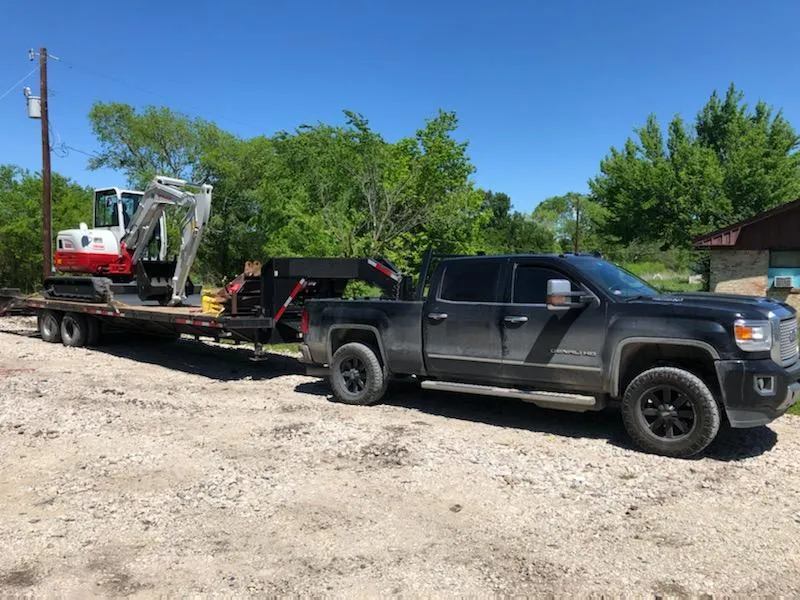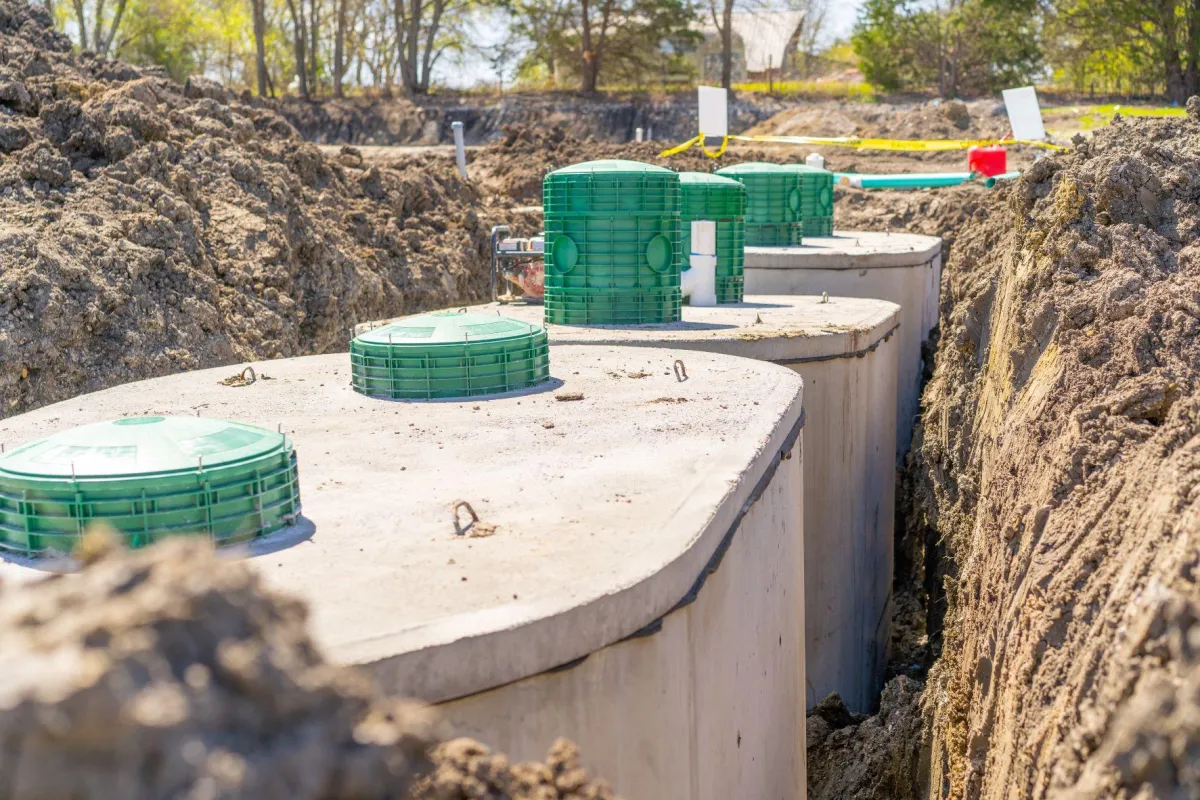
Serving Texas Counties: Collin, Grayson, Dallas, Denton, Rockwall, Fannin and Hunt
Septic Installation near Aubrey in Denton County, TX
Total Septic is Committed to superior quality and results!

AVOID COSTLY MISTAKES:
Do NOT hire an excavating contractor without first reading our free guide:
The ULTIMATE Excavation & Septic "Success Guide."

Septic Installation near Aubrey in Denton County, Texas: What It Involves
If your property sits outside a municipal sewer line, your septic system becomes the backbone of your home’s wastewater treatment. A proper installation isn’t just digging a hole—it’s science, precision, and compliance. In Denton County, soil types range from sandy loam to dense clay, which affects drainage, tank placement, and the type of system used. A professionally designed system ensures that wastewater is treated safely and that your yard, water supply, and property value stay protected.
How Can We Help?


What a Septic Installation near Aubrey in Denton County Includes
Site Evaluation:
A technician measures setbacks from wells and property lines, locates underground utilities, and performs a soil or percolation test to ensure compliance with local regulations. This determines how efficiently water can filter through your soil.
System Design:
Based on test results, the designer recommends a system type—gravity-fed, pressure dosing, aerobic treatment, or drip distribution. Each design includes detailed plans showing tank size, elevation, slope, and distribution methods.
Installation Process:
Crews excavate to precise elevations, install tanks and lines, backfill with care, and ensure watertight connections. Electrical components, alarms, and risers are installed for easy access and future maintenance.
Final Testing and Restoration:
The system is tested for leaks, inspected by Denton County officials, then backfilled and graded to restore your yard’s appearance.
Benefits of a Quality Septic Installation near Aubrey in Denton County, Texas
Environmental Protection: Proper treatment keeps contaminants out of groundwater and nearby creeks.
Reliability: Correct tank sizing and drainfield layout prevent backups, odors, and overflows.
Long-Term Savings: Quality installation minimizes costly repairs or premature system failure.
Property Value: A professionally installed septic system is an asset during resale.
Peace of Mind: Modern components, alarms, and accessible risers make upkeep simple.
Benefits of Hiring a Local Expert for Septic Installation
Knowledge of Local Regulations: Local professionals understand Denton County’s permitting and inspection processes, helping avoid costly delays.
Experience with Local Soils: Aubrey’s mix of clay and sand requires specific system designs that only seasoned local installers master.
Efficient Coordination: Local crews manage surveyors, inspectors, and electricians for a seamless installation.
Tailored Solutions: Every property has unique grades, trees, and space limits—local experts adapt systems to fit perfectly.
Faster Response Times: In case of issues, proximity allows for quick service and maintenance support.
See Our Excavation & Septic Services

✔️ Commercial Excavation
✔️ Residential Excavation
✔️ Demolition
✔️ Dozer work
✔️ Septic inspections
✔️ Septic system pumping
✔️ Septic installs traditional systems
✔️ Septic tanks - aerobic systems
✔️ Septic tanks - Plastic/poly
Quality Services Launched FAST!

✔️ Septic tanks - Concrete
✔️ Sewer repairs
✔️ Trenching
✔️ Utilities Trenching
✔️ Pump Outs Installs
✔️ Maintenance Contracts
What Are You Waiting For?
The Process for Hiring a Septic Installation near Aubrey in Denton County
Site Visit & Evaluation:
Schedule an assessment that includes a soil test and property layout review.
Proposal & Design Plan:
Get a written estimate outlining the system type, scope, materials, and timeline.
Permit & Scheduling:
Denton County approvals typically take 2–4 weeks, depending on weather and soil conditions.
Excavation & Installation:
Crews excavate, set tanks, install distribution lines, and wire electrical components.
Inspection & Final Approval:
County inspectors verify the system’s integrity before backfilling.
Documentation & Maintenance Plan:
You receive as-built plans, warranty details, and maintenance guidance.
System Types for Septic Installation near Aubrey in Denton County, Texas
System Type: Conventional (Gravity)
Best For: Good-draining soils
Key Benefit: Simple, low maintenance
System Type: Aerobic Treatment Unit (ATU)
Best For: Tight clay or limited space
Key Benefit: Superior treatment quality
System Type: Low-Pressure Dosing (LPD)
Best For: Shallow soil or uneven lots
Key Benefit: Even distribution, extended lifespan
System Type: Mound System
Best For: High groundwater or poor soil
Key Benefit: Elevates treatment above soil limit
System Type: Drip Distribution
Best For: Compact sites
Key Benefit: Efficient use of small areas
Owner Habits That Keep Your System Healthy
Space out laundry loads across the week.
Fix leaky toilets and faucets promptly.
Avoid dumping grease, chemicals, or non-biodegradable items down drains.
Keep vehicles and heavy objects off the drainfield.
Redirect roof and surface water away from the system.
Schedule regular pumping and filter cleanings.
These small practices extend your system’s life and keep repairs to a minimum.
Timeline and Budget Expectations in Texas
Design & Permitting: 2–6 weeks (depending on soil and review speed)
Installation: 2–4 days for conventional systems; 1 week or more for complex designs
Cost Factors: System type, excavation depth, soil quality, electrical work, and material quality
Always request an itemized quote to understand what’s included, and clarify payment milestones tied to design, installation, and inspection approvals.
Permits, Inspections, and Documentation
Denton County requires engineers or licensed sanitarians to submit system designs and soil results before issuing permits. Inspections confirm:
Correct elevation and setback compliance
Watertight tank and pipe connections
Proper grading and backfill
Operational pumps, alarms, and aeration
Keep your inspection reports, as-built diagrams, and service manuals for future reference—these protect you during resale or system modifications.
Why Quality Work Matters
Septic installation is buried work, but mistakes surface quickly. Poor leveling causes backups, undersized tanks overload easily, and shallow fields fail during rain. Professional installation prevents these headaches. A well-built system runs silently in the background, keeping your home safe, efficient, and worry-free.
Septic Installation near Aubrey in Denton County — Built for Long-Term Reliability
Whether you’re constructing a new home or replacing an outdated system, proper design, permitting, and expert installation ensure your property stays dry and healthy for decades. With local expertise, careful planning, and high-quality materials, you can trust your system to perform through every Texas season.
Facebook
Google Plus